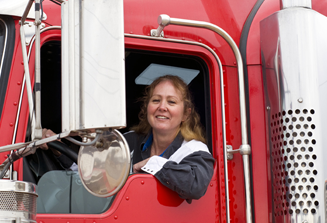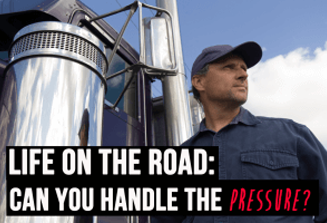RESOURCES
Helpful Information About Potential Welding Careers & Trucking Jobs
Check out this selection of articles below to learn more about career choices and how to prepare for in-demand job opportunities.
-

Activities to Do in Your Free Time
A main struggle for truck drivers is finding things to do during your down time while on the road. Everything is fine and dandy for most truck drivers when you're actually driving. However, it is when you aren't driving that things start to get a little boring. Limits to driving hours are necessary, but the extra time it gives you isn’t necessarily your friend. Boredom can set in really quickly, and you need to do more than simply sleep to pass the time. During your travels, you won't always be familiar with your surroundings. And even if you are, you can't exactly take off and drive to the movie theater in your truck. So, what’s a lonely driver to do? Hunker down in your sleeper? Luckily for you there are a lot of options.Sleep
How about simple sleep? It’s important to have hobbies, but don’t let it dominate your rack time. Getting plenty of rest is vital.Entertainment
Of course, you have the old standbys: reading and writing or some sort of hobby. These are all tremendous ways to pass the time, and can be educational for you as well. Many truck drivers bring DVD and blu ray discs or stream movies from services like Netflix or Amazon. The Internet gives you almost unlimited access to video and television on demand, depending on your programming provider.Exercise
Have you considered getting out of the truck and getting a little exercise? While you should take caution where you run depending on the availability of safe areas, you can get some fresh air and exercise outside of the truck. You can invest in a mat to keep in the truck if you want to do calisthenics right outside of the truck, or you can go for a jog.Online Games
Some drivers are gamers, and this can be a fun way to pass the time (and stay social via Internet connections), but you have to be careful to resist the urge to stay up all night playing. Also, you may run into bandwidth issues even if you can find a solid WiFi connection, as some free WiFi connections limit how much you can use (and gaming takes a ton, comparatively speaking).Become a Tourist
If you want to plan your trip out a bit more, you can always try stopping around destinations and do a little exploring. This can certainly be more difficult to plot out, but can be fun and rewarding if you do it right. Whatever you do, keeping yourself entertained while on the road is vital to your success as a truck driver. The old expression goes “all work and no play makes Jack a dull boy,” and so too can it make truck driving a dull profession if you don’t take care. Keep things fun! -

Which Meals and Snacks Are Best for Your Health?
A big part of staying healthy for truck drivers is establishing and maintaining good eating habits. But when you're in the trucking profession, where the more time you spend sitting most likely means more money in your wallet, it is easy to forget about this vital part of life. Unfortunately, too many people wait to make a healthy lifestyle a priority until it is too late. We understand that a lot of drivers are just unsure of how to properly eat healthy while living a lifestyle on the road. Relying on trips to diners, fast food, and convenience stores as the best options for food can be challenging. But a little good planning and knowledge can go a long way toward your health.Healthy Meals
Being away from home and having a strict schedule can tempt you to eat fast foods. The life of a trucker is often filled with burgers and fries, steaks and butter, and sour cream and coffee and soda. This is far from the healthiest meals you could be eating. Fast food is high in fat and full of empty calories, which provides no health benefits to you. Many people find they lose 5-10 lbs. in a month or so just by eliminating soda from their diets. A better choice is to set aside time and money to eat in a healthy and responsible way. We know that while when you’re on the road in rural areas looking to eat, options can be somewhat limited, that doesn’t mean you can’t exercise good food judgment and find something healthy to dine on. When dining in restaurants, many people looking for healthy options immediately think “salad.” This can certainly be a misnomer and certainly not always true. For example, a fried chicken salad can have cheeses, fatty dressings, and other high-calorie foods included in them, leaving them not much healthier than a burger and fries. For example, let’s choose a popular restaurant chain—Chili’s. If you order a plate of their boneless buffalo wings, you’re consuming 1,090 calories. The boneless buffalo chicken salad? 1,040 calories. The Caribbean salad with grilled chicken? 720. The Quesadilla Explosion salad will set you back 1,430 calories. Even their grilled chicken sandwich has over 1,000 calories. It’s more important to be creative: look for grilled chicken and fish as a staple of your restaurant dining. Look for vegetables and fruits, and maybe rice instead of fries. Also, drink water instead of soda. Soda is empty calories, and just 3 or 4 per day can add hundreds of calories to your daily intake. For example, Chili's lighter choices feature steaks, salads, and chicken platters, with Ancho Salmon being the most calorie-rich with 600. Most of those dishes are about half the calories of the above dishes. Just being aware and making the right decision can make a big difference.Snacking right
When you’re fueling your rig, you pick a few choice items from the station’s store, right? Beef jerky, potato chips, candy bars? It’s no secret these are mostly empty calories, and while they taste good, they also have almost no nutritional value whatsoever. What is a better option? A small cooler filled with fresh fruit and vegetables. Cut up apples or celery and a little peanut butter. Raisins or dried cranberries. Trail mix, peanuts, or almonds. Stash a few bottles of water in there as well. Of course there is limited space in your trunk, and things like ice need to be replenished on a regular basis. But a small cooler doesn’t take up that much space, and compared to paying convenience store prices, you may be saving yourself a lot money and calories along the way. With these few changes in mind, what is the best way to get started?Find Time for Exercise
Even if you can’t go 30 minutes a day on the treadmill, you can still squeeze in some stretches and a little cardio if you know what you’re doing. If you’re in a place where you can’t go for a jog, run in place for a few minutes, or jog laps around the truck stop. Do some jumping jacks or buy a jump rope. Find some time to do some stretches when you wake up and before you go to bed. Start slow, doing only what you can do, then work up. Set goals and push yourself a little more each day as you get stronger.Do your Homework
First, do a little research. There are websites devoted to maintaining the health of truck drivers that can offer excellent tips on staying healthy on the road. These sites are often developed by truck drivers and can provide you guidance on all aspects of staying healthy on the road. Next, make a plan. It is much easier to make a change in your life if you have a plan to stick to. Spend some time to write down a schedule, shop for healthy snacks or plan out meals along your route.Why all this emphasis on health?
You’re driving a truck, not becoming a professional athlete, right? That is true, but driving a truck is a physical job that requires people who need to be high functioning. When you are a truck driver, there are dangers to putting on weight beyond heart disease, diabetes, and hypertension. When you are carrying extra weight, you are prone to sleep apnea and fatigue. That can spell trouble when you are driving on long, dull stretches of highway, which can make you more likely to fall asleep behind the wheel. Also, over time that extra weight can lead to those other issues. Unhealthy truck drivers are prone to ailments that cause problems in their extremities, particularly the feet and legs, which can make driving uncomfortable, and later, can cause you severe pain. As you get older, it may become increasingly difficult to impossible to do your job. Your health is ultimately your own business, but if you want to remain healthy, follow some of these steps and take precautions. The key is to eat less high-fat, high-calorie fare, and more natural fresh fruits and vegetables. By simply making wise eating decisions, you can stay healthier and have a longer, more productive, more enjoyable career. -

Questions and Answers from the Trucking Community
Welcome to the Message Board. This page is a collection of messages posted by drivers in the trucking community, who have shared Questions and Answers on trucking forums across the internet. Updated regularly, please check back often. “Moving from driver to O/O [Owner/Operator] is more business sense than it is driver skill. Go talk to S.C.O.R.E or the local office listed at the bottom of this page. Microloan Program | The U.S. Small Business Administration | SBA.gov The folks in the "Participating Intermediary Microlenders Report" link They will work with you to help figure out how to get into a truck etc, write a business plan (it can be as simple as a napkin or more complicated). Financial statements etc. In short, they will give you a quick lesson in business management.” --User “mndriver,” offering advice (and reference links) to a driver with five years of Class A experience who is asking for advice on starting his own trucking company, at Truckers Forum.net.
“Read everything. Speed limits, restrictions, routing instructions, Bill of landings, owner’s manual to your truck, messages from dispatch, I mean everything…it’s usually al there somewhere.” --Oldman49, responding to a user requesting advice on making their trucking career as smooth as possible, on a thread at The Truckers Report.
“1. Keep paper towels on the truck 2. Keep wet wipes on the truck 3. Keep some canned food on the truck 4. Keep some water / soft drinks on the truck 5. On hot days offer water/soft drinks to the guards or unloader/loader. You may get better treatment (especially if you have their favorite.) 6. Expect everyone in front of you to do something stupid and plan accordingly. 7. Don't be lax in your duty, but don't stress either 8. Promptly get your paperwork in 9. Present a professional image to the customer (you represent your company.) 10. Practice trip planning every day.” --Forum user “Salad,” in response to the thread “Any tips for a new driver?” on The Truckers Report,
“I want to be a trucker driver because..... It's time for me to do something I've always wanted to do. I've worked good jobs that I hated for all of my married life. It served me and my family well, and I was happy to do it, and have always been proud of the life my wife and kids enjoyed because I worked hard, even if I didn't like the work. But I've always wanted to drive long haul OTR, it's just that married life and two beautiful children sort of put that choice on hold. But those responsibilities have ended and now I can work at something that I think will suite [sic] me well. I enjoy the solitude of the road, while I wouldn't say I'm loner. I've always strived to have a minimal lifestyle. For me simple was always better. I'm going to enjoy not being in the same place every day, even if it looks the same (if you've seen 1 truck stop....) --User “BeanDip,” responding to a thread asking “Why do you want to be a truck driver?”
“You are going to need a year of driving, to just adapt to the lifestyle. Also, to develop your driving skills, and work relationship with your dispatcher, and learning how your company does business. None of this comes quickly, and your attitude is being closely watched. Remember...you are responsible for much of the business success or failure. Tremendous amount of money goes into that rig, freight, and contract with the client....and you are the backbone of it all.” User “Roadhog,” in a thread titled “The Driver and The Employer, Basic Job Hunting Skills,” on the Class A Drivers Message Board.
“Hello guys its been a week since I graduated cdl school, and I have already been offered a job…with a local milk delivery company driving Class B trucks (I have my Class A). I start tomorrow morning. For all the people asking if it’s possible to find a local job with no experience its possible you just have to put in some work. I…found out these companies’ contact information and office location and either called or just showed up with a simple resume and told them I’m looking for a Class A or B driving position and was straightforward about being straight outta CDL school (with) no experience I…went to a CDL staffing agency, where I was told that I would need at least a year experience and no one would hire me local I would need to go OTR. If you want a local job without experience, go out there and get it. Don’t just call or put an application in online, go down to the company and tell ‘em you want to work for them (they love this kind of initiative). Bring a resume with you, bring a copy of your driving abstract cdl & medical card.” --User “RedTheTrucker,” on the post “How to Find a Local Job with No Experience??” at The Truckers Report.
“Holding a CDL has made me a substantially better driver. Its corrected a lot of bad habits I never realized I had. I've acquired a lot of patience and no longer feel the need to speed in my car... I no longer feel the need to tailgate... I've garnered a great deal of tolerance for traffic... I love having the ability to decipher when a car or truck is about to do something stupid. I also read every single sign on the road now out of habit. My CDL has turned me from a decent driver to a professional driver.” --User “KiLLaZiLLa93,” responding to the question “Has your CDL made you a better driver?” on The Truckers Report.
“If it were me, would stay there another 6 months. Looks better on your home loan application also that you’re not a job hopper.” --User Chinatown, in response to a user who asked for advice on leaving his first trucking job six months after earning his CDL, at The Truckers Report. -

Important Things to Ask in Your Next Trucking Interview
There are few tasks as potentially uncomfortable as a job interview, especially a trucking interview. You’re under the microscope, being needled by one or more members of a company you may or may not be desperate to work for. For truck drivers looking for their first jobs, it can be even more harrowing and confusing. And while many applicants are bracing themselves for the questions they are going to have to answer, many forget to do the reverse, which is equally important to getting the job and to taking some semblance of command of your job search: what questions should you be asking? Most of us, especially those of us who are younger, can easily forget that the questions we ask say just as much about us as the ones we answer. Many employers gain more information from that portion of the interview than the part when we are answering questions. And why not? It is revealing about you which questions you ask. It demonstrates what is important to you as an employee and a person. If you lead with “how much does this position pay?” chances are you are going to be looked at as a money chaser, not a potentially valued employee. You need to be measured in your responses and ask pointed, important questions about the nature of your work. Here are some questions you should be posing to the companies interviewing you: What is your policy on home time? When you’re an over-the-road driver, you’re going to be spending a lot of time away from home. It’s only fair for you to know how long you will be home in between. Also, be sure to get a clarification on defining “a day”; for instance, if you are promised two days of home time after a week-long trip, is that two full days, or the remainder of the day after you return to the terminal, then one day after? Some companies will not offer to tell you this information. Which routes will I be driving? You want to know what your typical routes will look like. This is a common question to ask, and you should be immensely curious about it. You may want to ask this question first. Am I unloading my own truck in this job? Some companies pay the drivers to load and unload your freight, while others pay people known as “lumpers” to do it for you. Whether or not you are able or willing to do this part of the job is pretty important, and you should know going in whether you’re doing the heavy lifting, or if others are doing it for you. Will I get a driver manager? For younger drivers, a driver manager can help you adapt to the trucking industry and establish a good relationship with the company. With the ability to answer your questions and offer you training and advice, a driver manager can help you become promoted more quickly, as well as help you handle any issues or concerns you may have. What type of equipment does the company use? Again, another important question that both answers a question about your potential comfort and productivity, and about the company itself. Are the trucks old? If so, they may be perpetually breaking down and harming your ability to be productive. If they continually spend on new equipment, that may be a good sign. Also, will you have a sleeper on the truck? Will you have an air-ride suspension? When you’re sitting in the truck all day, these are potentially important questions. Does the company have a slip-seat policy? “Slip-seat” means that when a driver has time off, another driver may take his place driving his route. That means another driver behind the wheel of your truck, which can make some drivers uncomfortable. It’s better to know whether you will be subject to this before you begin. How much does the company pay? Yes, it’s a question you should ask, even if you shouldn’t ask it first. Ask all of the questions about the job first, then lead into the question of pay. Compare it to average driver pay scales and see where they rank. While you want to be delicate question to ask, it is important to remember that you are a professional and pay should be on your mind at some point. Don’t forget to get information on any bonuses you may receive as well. What benefits does the company offer? Medical insurance, time off, home time, disability coverage, 401(k) matching; these are all important factors in whether you should accept a job or continue looking for a new one. To be certain, as a job prospect you are putting yourself in a position to be asking for a job. But don’t discount what you bring to the table in this relationship, and the fact that you will be serving this company every day of your working life while you’re employed there. Be sure you are showing respect to the company, but also demand it in return. A good, solid professional attitude will go a long way in getting you a job. -

Discover the Biggest Struggle Truck Drivers Face
Ask most any driver about the biggest source of stress for truckers, and invariably the answer will be “time away from home.” And indeed it is an eternal source of consternation for many a truck driver, and is chief among reasons why this isn’t a profession fit for just anyone. However, if you are reading this, chances are fair that you are already expecting this part of the job, and you fall somewhere between embracing this part of the job and tolerating it for the sake of a paycheck. But once you are out on the road, buddy, it’s a whole new ballgame. It’s one thing to be a single person, a young man or woman, ready to make your way out onto the open road, just you and your rig and the load you’re carrying, but once you’re out there and reality sets in that you’re out here alone, your thinking can change really quickly. Of course, when you’re on the road and working, concentrating on your electronic logs and on paying attention to the road and keeping the truck in the proper lane, you may not be thinking too much of what you are missing at home. It’s the time when you aren’t driving, when you’re hunkered down in a truck stop, waiting in line to take a shower or nestled in your tiny bunk in the back of your truck that reality sets in. Do you have a special someone at home? Be sure they can handle the pressure too. Many a driver had his career, or marriage, derailed by a significant other who grew weary of the solitude that many young truckers crave. Remember that when you have a family, truck time doesn’t only affect you; it takes hold of everyone in your family. Going over the road can indeed be tough. If driving a truck takes a special breed of person, going over the road can take a saint. Recognize what it is you’re missing out on, and what you have to deal with when you return, and be ready to make accommodations for those things. So what are some good coping strategies for this biggest source of stress for truckers? Well, that’s difficult to say, because only those who have been on the road truly know what it is like to be out there. Of course, those of us who don’t have the privilege of living that life can only offer suggestions. Even those who do go out on the road may enjoy their own processes and recipes for fun and success, but you have to find what works for you and roll with it. Here are a few suggestions for coping:- Make the most of home time. Get things done. Spend time with your friends and family, and try to stay away from work as much as possible.
- Call home frequently. Speak with loved ones often, many times for no reason. Make sure you are staying in the loop on what’s going on back at home and at the old haunts.
- Keep yourself busy on the road. Have a hobby or something meaningful to do while you’re on the road. Get plenty of exercise, rest, and good food (that is, NOT junk food).
- Maintain a positive attitude. Understand that loneliness is normal, and is a temporary feeling. You will have home time, and you will have the chance to make the most of it.
- Find a routine that works for you. What keeps you happy when you are on the road and not working? Do you have a certain author’s books that you like to read? Do you stream video? Do you like to knit? Whatever it is, find what works and keep it going.
-

Everything You Need to Know About the PSP
You’ve probably already heard of the PSP, and how your score can affect your employability within the trucking industry. But just what is the pre-employment screening and how does it affect you? Does that fender-bender you had on that rain-slicked road when you were 17 mean that you can’t get a CDL? Does that speeding ticket, then the ticket for making an accidental illegal right turn on red at an intersection between 1 pm and 6 pm mean that trucking companies won’t touch you with a 10-foot pole? If you are really hoping to land some of those truck driving jobs, you need to be educated about the PSP, what it means for your trucking career (before it even starts) and what you can do to keep it under control. Here are some frequently asked questions about the PSP and how it affects you as a truck driver.- What is the PSP?
- What is in the PSP?
- Why is the PSP important to employers?
- What does the PSP mean for me as I apply for trucking jobs?
- Do all trucking companies use the PSP? Is it required?
- How do carriers get access to my PSP? Can I block them from seeing it?
- Can I see my PSP?

